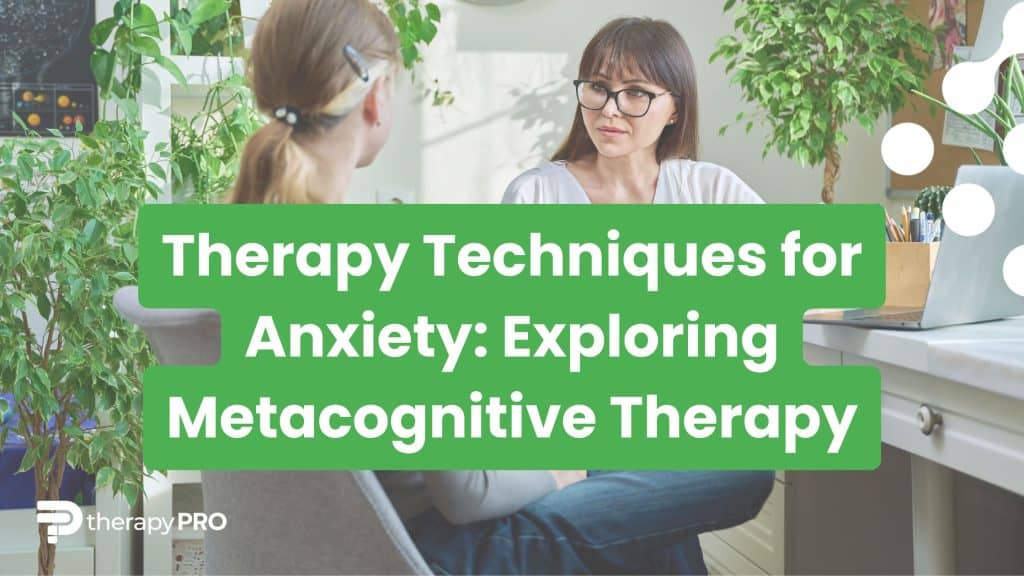Therapy Techniques for Anxiety and Why “Thinking About Thinking” May Be Key
Do you ever catch yourself stuck in a loop of overthinking, or even worrying about how much you worry? You’re not alone. And not all therapies approach anxiety in the same way.
In this article, we explore Metacognitive Therapy (MCT), a highly effective approach for treating anxiety.
Let’s take a closer look at why thinking about thinking might be the key to breaking free from anxious spirals.
Exploring evidence-based therapy techniques for anxiety
People seeking support for anxiety might be introduced to evidence-based therapies like Cognitive Behavioural Therapy (CBT), Acceptance and Commitment Therapy (ACT), or mindfulness-based approaches.
These interventions can be effective for a wide range of people and often focus on:
- Identifying unhelpful thoughts
- Increasing emotional awareness
- Fostering acceptance of difficult feelings
However, for some individuals, these approaches may not fully address the processes that maintain anxiety, particularly repetitive patterns like worry and rumination.
In such cases, exploring how we respond to our thoughts, in addition to understanding our beliefs about the usefulness of these thinking processes, can offer another therapeutic perspective.
MCT is one approach that targets these underlying cognitive processes.
It’s important to note that no single approach works for everyone. Effective support often comes from understanding each person’s experience of anxiety and tailoring therapy to suit their needs.
What is Metacognitive Therapy (MCT)?
MCT focuses on how we respond to thoughts, not the thoughts themselves. You may have commonly heard the technique referred to as thinking about thinking.
MCT can help you recognise worrying about the future, and ruminating about the past are behaviours you engage in because they feel helpful – even though they’re not. They can be the unhelpful cousins of problem solving.
MCT helps you shift away from going down the rabbit hole of ’what ifs’ to more solution-focused actions. It also helps build your confidence that you can manage, direct, and control your thoughts. For some people this shift can improve sleep, social connections, and reduce anxiety.
While results vary between individuals, MCT is an evidence-based intervention that has been shown to be effective for helping manage Generalised Anxiety Disorder, Obsessive Compulsive Disorder, and Post Traumatic Stress Disorder.
What to expect with MCT?
MCT includes several therapeutic techniques designed to help you take back control of your thinking. You can expect to work through:
- Psychoeducation
- Building insight into current challenges
- Detached mindfulness
- Attention training and mindfulness practice
- Challenging metacognitive beliefs that keep the worry going like:
- “I feel out of control”
- “My worry is dangerous and will harm my mental health”
- “My worry is helpful”
- Developing active coping strategies
- Switching to solution-focused behaviours that can be actioned in the real world
Online group therapy – and why it might work for you
Can group therapy be done online? Yes, it absolutely can, and for some individuals, it can effectively help you to meet your goals with managing worry and rumination.
Some benefits of online group metacognitive therapy techniques for anxiety include:
- Peer support
- Shared experiences of overthinking and anxiety
- Structure learning and practice
- Guidance from a qualified facilitator (usually a psychologist)
- Flexibility, accessibility, and affordability
What are some steps can you take next?
We know it can be hard to battle anxiety and seek help. If you’re ready to seek support, our warm and understanding team are here to help with our 7-week online group therapy program.
Designed specifically for people struggling with worry and rumination, it is a space to learn, grow, and shift your relationship with anxiety.
We limit spots to 6-8 to ensure all group participants get the most out of their time with the facilitator. Read more about our online group therapy program.
About Therapy Pro’s psychology team
Therapy Pro’s team of registered and provisional psychologists support both NDIS participants and private clients across Australia. Our psychologists address a wide range of psychological needs – from anxiety, depression, and trauma to life transitions, behavioural concerns, and developmental challenges.
As a registered NDIS provider, Therapy Pro delivers psychology supports under Improved Daily Living funding, providing clients with high-quality, evidence-based interventions. We also offer services outside of the NDIS for individuals seeking private, fee-for-service, WorkCover, and Medicare psychological care.
Whether accessing therapy through the NDIS or privately, all supports are delivered by qualified psychologists working under nationally recognised ethical and professional standards.
++++
Important notice: This information is general in nature and is not intended as personal advice. Individual responses to therapy vary. We recommend consulting with a qualified professional to discuss your specific circumstances and determine the most appropriate treatment approach for your needs.




